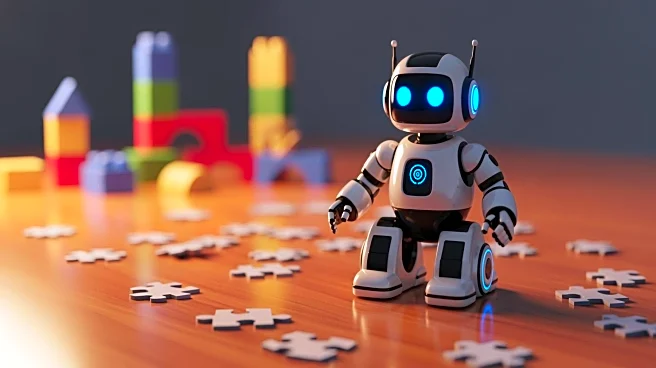What's Happening?
AI-powered toys from China are making their way to American shelves, with the market for smart AI toys currently valued at $34.87 billion and projected to reach $270 billion by 2035. China is expected to contribute significantly to this growth, accounting
for 40% of the market expansion. These toys, such as FoloToy and BubblePal, offer interactive experiences by mimicking human speech and behavior. While some view these toys as educational tools, concerns have been raised about their impact on children's social skills and mental health. Experts warn that excessive use of AI toys could diminish real playtime and social interactions, potentially leading to emotional and cognitive challenges for children.
Why It's Important?
The introduction of AI toys in the U.S. market highlights the growing influence of technology on children's development. As these toys become more prevalent, they could reshape traditional play and learning experiences, raising questions about the balance between technology and human interaction. Parents and educators may face challenges in managing children's exposure to AI toys, which could affect their social skills and creativity. The debate over AI's role in children's lives underscores broader concerns about technology's impact on society, as Americans express mixed feelings about AI's benefits and risks.
What's Next?
As AI toys continue to gain popularity, stakeholders such as toy manufacturers, educators, and policymakers may need to address the ethical and developmental implications of these products. Companies like Mattel are already collaborating with AI firms to create age-appropriate play experiences, suggesting a trend towards integrating AI into children's toys. Future discussions may focus on establishing guidelines and regulations to ensure that AI toys support healthy development and do not replace essential human interactions. The evolving landscape of AI toys could prompt further research into their long-term effects on children's cognitive and emotional growth.
Beyond the Headlines
The rise of AI toys also raises questions about data privacy and security, as these toys often collect and process personal information. Parents may need to consider the potential risks associated with AI toys, including data breaches and unauthorized access to children's information. Additionally, the cultural implications of AI toys originating from China could influence consumer perceptions and market dynamics, as concerns about technology from China persist. The integration of AI into children's toys may also reflect broader societal shifts towards digitalization and automation, impacting how future generations interact with technology.


















